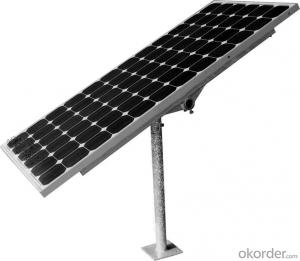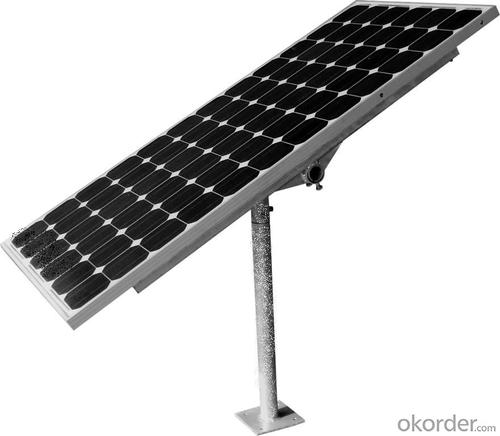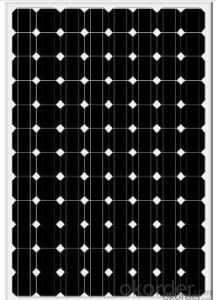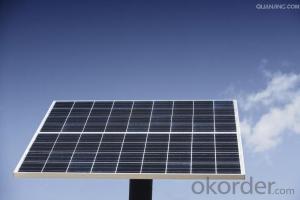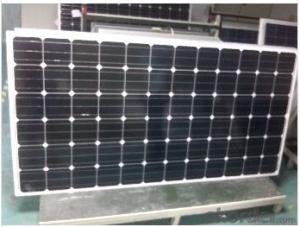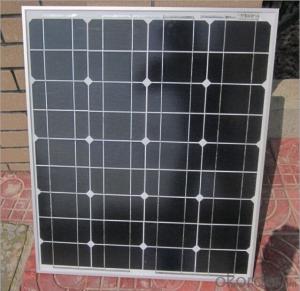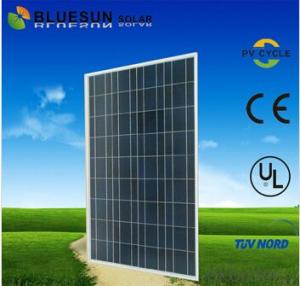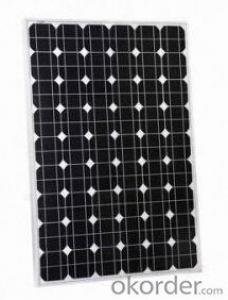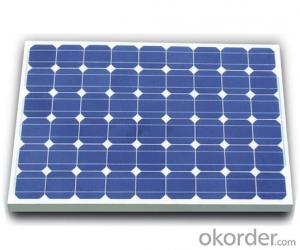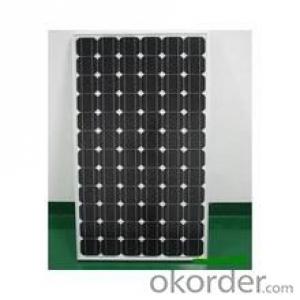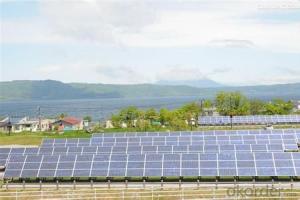40W Monocrystalline Silicon Solar Panels in Africa
- Loading Port:
- Shanghai
- Payment Terms:
- TT OR LC
- Min Order Qty:
- 10000 watt
- Supply Capability:
- 1000000 watt/month
OKorder Service Pledge
OKorder Financial Service
You Might Also Like
Specification
Product Description
Monocrystalline Silicon Solar Module 40W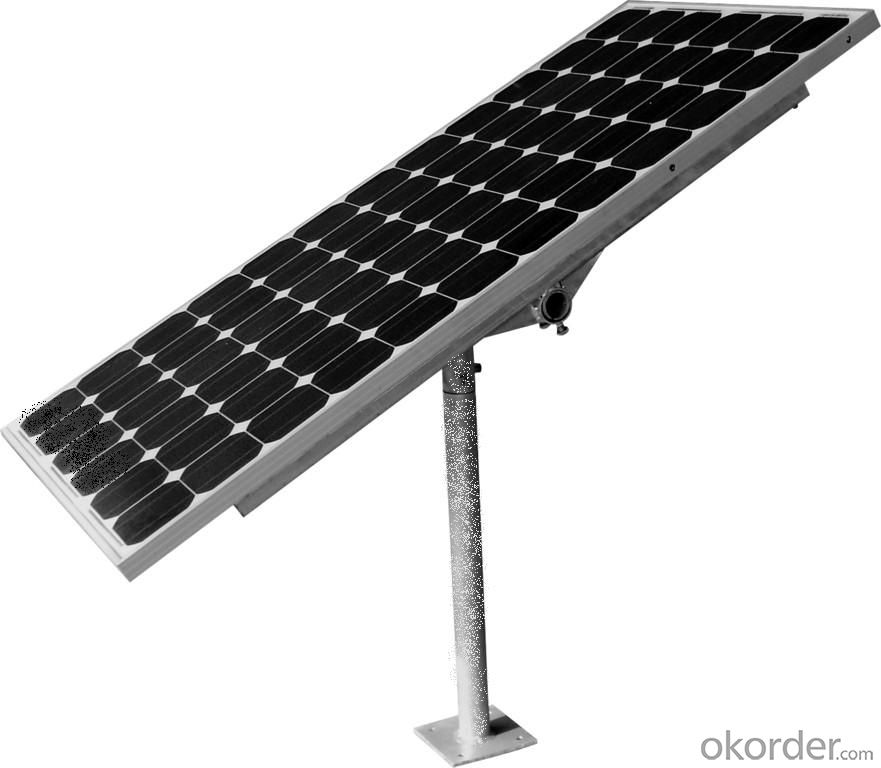 Product Description
Product Description
solar Panels which are made of high quality cells are laminated with high-intensity and high transparence tempered glass integrated with TPT, EVA seal material by specialized equipment.
Over 25 years life time, hailstone resistance, working in good order under great changes of temperature.
Specifications for Mono-crystalline Silicon Solar Module with 40W Maximum Power
Mechanical Characteristics | |
| Cell type | mono-crystalline silicon solar cells |
| Cell layout | 4*9 |
| Number of cells | 36pcs |
| Module dimensions | 477*536*25mm |
| Frame | anodized aluminum,grey or black |
| Junction box | IP65 |
| Connectors | MC4 or MC4 compatible(optional) |
| Net weight | 3.0kg |
| Packing | 7pcs/ctn |
| Electrical Characteristics | |
| Peak power(Pmax) | 40W |
| Power tolerance | ±3% |
| Max.system voltage | 715VDC |
| Open circuit voltage(Voc) | 21.5V |
| Short circuit current(Isc) | 2.55A |
| Max.power voltage(Vmp) | 17.5V |
| Max.power current(Imp) | 2.29A |
| Temperature coefficients of Isc | 0.035%/ºC |
| Temperature coefficients of Voc | -0.33%/ºC |
| Temperature coefficients of Pmax | -0.43%/ºC |
| Cell Efficiency | ≥17% |
| FF | 73% |
| Standard Test Condition(STD) | Irradiance:1000W/m²;Cell temperature:25ºC;AM:1.5 |
Features:
1) High reliability with guaranteed +/-3% output power tolerance
2) The modules can withstand high wind-pressure, snow loads and extreme temperatures
3) Bypass diodes to minimize power loss with shading
4) High and stable conversion efficiency to ensure the highest quality
Quality and Safety
1) Industry leading power output warranty, 25 year 80%, 10 year 90% power warranty and 3 year power warranty
2) ISO9001: 2008 (Quality Management system) certified factory
3) Product Quality warranty & products Liability Insurance to guarantee and user' benefits
EN 6100-6-3: 2007 EN 6100-3-1: 2007(IEC 61000-4-2: 2008
Our advantages:
High quality materials: High insulation TPT, Anti-aging EVA
Focus on each process during manufacture
Experienced engineers and workers
Fast delivery: 7-15 DAYS High efficiency and long time warranty
- Q: if you move a solar panel or there was a vibration that caused the panel to move, would that affect it?
- clearly. if the panel is moved, its action will be distorted. it should be kept in a level, stable location to reduce likelihood of such events occuring.
- Q: I am interested in installing a home solar panel system. In my city, we get a little over 5 hours of sun, and I typically use about 800-900 kwh per month.The available roof space is small- approximately 600 sqft.The online calculators provided on various sites are not uniform, thus providing inconsistent responses with the same input data.I think I need a 5kw system approximately. Can anyone verify that and provide a link for a reasonably priced system to meet my needs? Prefer grid-tied, but off-grid is acceptable as well.Thanks!
- Himin Solar can help you design and install home solar panel system.
- Q: Does anybody know if there are any courses for solar panel installation, and/or what trades you need for this position?
- If you are in the UK, then the Centre for Alternative Technology courses (CAT in Wales) have had some great feedback.. .. A lot of companies are actively recruiting and offer training courses as part of their induction. Have a look at the bigger ones recruiting near you.
- Q: Can solar panels be installed on a garage or carport?
- Yes, solar panels can be installed on a garage or carport. In fact, these structures often provide ideal locations for solar panel installation due to their large, flat rooftops or open spaces. Installing solar panels on a garage or carport can help maximize energy generation, reduce electricity bills, and provide shade for vehicles or additional usable space.
- Q: I've found something called maximum system voltage 000v on my 0 w panel nameplate. Its impossible for 0w to have 000v, right?
- Contact the manufacturer of your panel(s) for the information you seek
- Q: Can solar panels be used in cold climates?
- Yes, solar panels can be used in cold climates. While colder temperatures can slightly reduce their efficiency, modern solar panel technology is designed to work effectively in a wide range of temperatures. Additionally, snow can easily be cleared from the panels, allowing them to continue generating electricity during the winter months.
- Q: Can solar panels be used in areas with high levels of pollution from industrial activities?
- Yes, solar panels can be used in areas with high levels of pollution from industrial activities. While pollution can have some impact on the efficiency of solar panels, they are still able to generate electricity even in polluted areas. Regular cleaning and maintenance of the panels may be required to ensure optimal performance. Additionally, installing solar panels in such areas can help offset some of the carbon emissions from industrial activities, contributing to a cleaner and more sustainable energy future.
- Q: Can solar panels be installed on churches or religious institutions?
- Yes, solar panels can be installed on churches or religious institutions. In fact, many religious institutions have embraced solar energy as a way to reduce their carbon footprint and promote environmental sustainability. Installing solar panels on churches not only helps them save on energy costs but also serves as a symbol of their commitment to caring for the planet and being good stewards of the environment.
- Q: 3.8 volts is required to fully charge a battery. But at 3.8 volts, the battery can be overcharged without the use of a controller correct? What if I don't care if the battery is fully charged? In the case of our family boat, I just installed a new radio, so I'm a little worried about power consumption. So now for the real question; If I hook a 2 volt panel to the batteries, do I need to worry about overcharging them? Or will the batteries stop the charging process once they reach 2 volt?I built the panel myself, it's 8 volts at 3.5 amps open circuit. I have tabs at every 3 volt increment on the panel so that I can use less voltage than 8 if I want to power something directly, (ex:2 volt radio)So I'm using the 2 volt tab at 3.5 amps(approx) for a total of approx 48 watts
- I have been using solar panels for over ten years never until recently bothered to use a charge controller, it depends really on how much power your batteries can hold how often they will be drained from use of the connected dc-ac inverters. While constant daylight charging at 8v 3.5a/hr is quite heavy it is not excessive, 2v lead acid battery chargers give a voltage output of appx 4.8v but the fluctuating output of a solar panel means you may well charge at 8v for some time but with occasional shade etc it will more likely average at 5v which I think is quite acceptable.
- Q: Do solar panels work at night?
- No, solar panels do not work at night because they require sunlight to generate electricity.
Send your message to us
40W Monocrystalline Silicon Solar Panels in Africa
- Loading Port:
- Shanghai
- Payment Terms:
- TT OR LC
- Min Order Qty:
- 10000 watt
- Supply Capability:
- 1000000 watt/month
OKorder Service Pledge
OKorder Financial Service
Similar products
Hot products
Hot Searches
Related keywords
